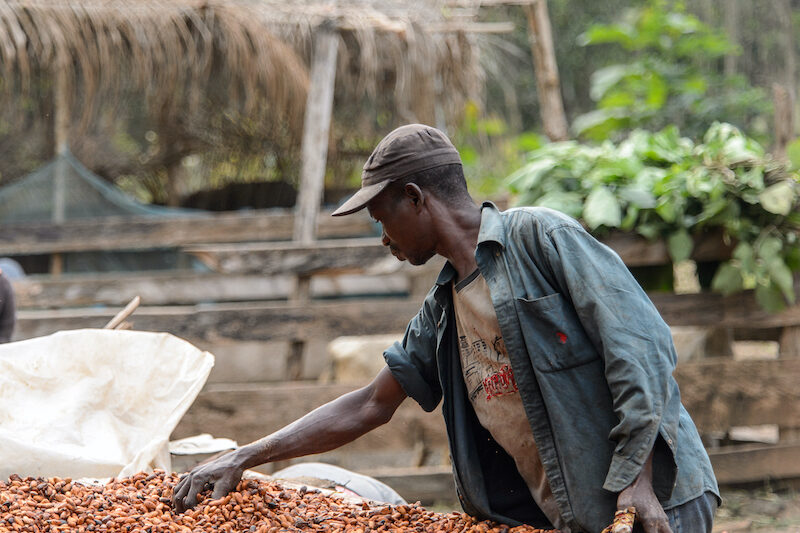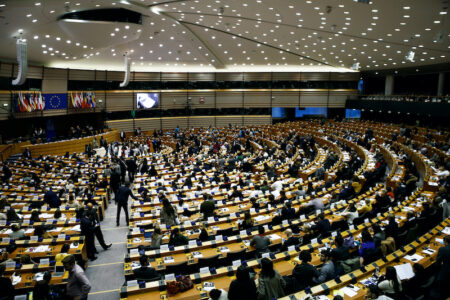Fairtrade sustainability training schemes make gains in Ghana and Ivory Coast

Cocoa farming in Ghana. Pic: Shutterstock
Results from a new Fairtrade study have found that it has attained a notable expansion in sustainable practices training provision for farmers under its West African Cocoa Programme (WACP), across Ivory Coast, Ghana and Sierra Leone, writes Neill Barston.
The global movement’s fourth edition of its agricultural scheme’s monitoring report showed that last year, of 48,876 participants, which included 11,812 women, 24 percent engaged with its learning initiatives. This represented a 22% increase on figures from two years ago.
Significantly, the organisation explained that its key topics included human rights and environmental due diligence, deforestation, and traceability and transparency. These modules are specifically designed for the West African cocoa context and are regularly updated due to the evolving cocoa landscape.
Data for the report was obtained via interviews with small producer organisation management and household interviews with the farmer members of small producer organisations, and comes as the sector has faced severe strain, with prices rising rapidly to more than $12,000 a tonne over the past year. But a sharp decline in the past month has seen the commodity’s prices on New York Futures markets tumble more than 30% to just over $7,000.
Consequently, the impact on driving forward plans to deliver a living income for the industry is now uncertain, given that governments in both Ghana an Ivory Coast raised farm gate pay levels to around $2,470 a tonne. With contracts being negotiated a year in advance, the market will be watching closely as to whether the pattern of pay increases will be continued.
As Fairtrade noted, the increase reflects the success of a “cascading” approach in which Fairtrade Africa trains a set of cooperative managers and farmers, who then bring the information back to their organisations and communities to replicate the trainings themselves. This expands the number of participants, while also entrenching the knowledge and skills more deeply within organisations.
Critically, the social justice movement stated that as its programme continues to evolve, it will continue work with small producer organisations on the ground as they prepare for the next challenges that await them in the cocoa sector, especially the new regulatory demands of the EU Deforestation Regulation and the human and environmental rights due diligence. Fairtrade has partnered with experts, such as Satelligence, who will provide SPOs with access to high quality deforestation risk analysis.
In addition to an in-depth analysis of trainings, technical support, peer-to-peer learning, and sales for small producer organisations (SPOs), the report also focused on programmes and case studies. The Fairtrade Young Cooperative Managers Academy, active in Ghana and Côte d’Ivoire, provides young people with entrepreneurial skills via training, hands-on assignments, coaching and mentoring.
Dwomor Boahene, member of Asunafo North Cooperative Union, called the academy “a life-changing experience.” Along with being elected as a member of the Supervisory Council/ Control Committee within the union, Dwomor has trained women in surrounding communities in what he learned, so they are now running their own small businesses and they’ve also learned how to set up savings accounts.
Furthermore, in Ivory Coast, the Women’s School of Leadership (WSOL), a training programme aimed at improving women’s basic leadership skills and the application of human rights provisions on gender issues, is showing signs of great progress.
Since 2017, 205 graduates have gone on to share their knowledge and skills with over 10,000 community members. The Women’s School of Leadership covers topics, such as personal development, gender, leadership, income diversification, project management, strategic negotiation, financial management, and entrepreneurship.
Dora Atiiga, a WSOL graduate, Kukuom Union, explained that at the WSOL she learned that as a woman she could be of great use to her household and her community. For example, there was no pre-school for children in Asibrem and therefore she decided to start one with the knowledge and skills she learned at the WSOL.
Fairtrade believe that cooperatives have a critical role in the sustainability and growth of the cocoa sector. For this to happen it is important that the farmers who belong to the cooperative participate in and trust the cooperative. In 2023, 99 percent of Ghanaian farmers interviewed and 92 percent of Ivorian farmers thought different opinions could be raised in their cooperative.



